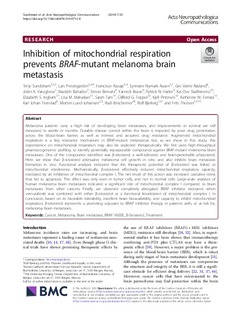Inhibition of mitochondrial respiration prevents BRAF-mutant melanoma brain metastasis
Sundstrøm, Terje; Prestegarden, Lars; Azuaje, Francisco; Aasen, Synnøve Nymark; Røsland, Gro Vatne; Varughese, Jobin K.; Bahador, Marzieh; Bernatz, Simon; Braun, Yannick; Harter, Patrick N.; Skaftnesmo, Kai Ove; Ingham, Elizabeth S.; Mahakian, Lisa M.; Tam, Sarah; Tepper, Clifford G.; Petersen, Kjell; Ferrara, Katherine W.; Tronstad, Karl Johan; Lund-Johansen, Morten; Beschorner, Rudi; Bjerkvig, Rolf; Thorsen, Frits
Journal article, Peer reviewed
Published version
Permanent lenke
http://hdl.handle.net/11250/2611636Utgivelsesdato
2019Metadata
Vis full innførselSamlinger
- Articles [3012]
- Publikasjoner fra CRIStin [3070]
Sammendrag
Melanoma patients carry a high risk of developing brain metastases, and improvements in survival are still measured in weeks or months. Durable disease control within the brain is impeded by poor drug penetration across the blood-brain barrier, as well as intrinsic and acquired drug resistance. Augmented mitochondrial respiration is a key resistance mechanism in BRAF-mutant melanomas but, as we show in this study, this dependence on mitochondrial respiration may also be exploited therapeutically. We first used high-throughput pharmacogenomic profiling to identify potentially repurposable compounds against BRAF-mutant melanoma brain metastases. One of the compounds identified was β-sitosterol, a well-tolerated and brain-penetrable phytosterol. Here we show that β-sitosterol attenuates melanoma cell growth in vitro and also inhibits brain metastasis formation in vivo. Functional analyses indicated that the therapeutic potential of β-sitosterol was linked to mitochondrial interference. Mechanistically, β-sitosterol effectively reduced mitochondrial respiratory capacity, mediated by an inhibition of mitochondrial complex I. The net result of this action was increased oxidative stress that led to apoptosis. This effect was only seen in tumor cells, and not in normal cells. Large-scale analyses of human melanoma brain metastases indicated a significant role of mitochondrial complex I compared to brain metastases from other cancers. Finally, we observed completely abrogated BRAF inhibitor resistance when vemurafenib was combined with either β-sitosterol or a functional knockdown of mitochondrial complex I. In conclusion, based on its favorable tolerability, excellent brain bioavailability, and capacity to inhibit mitochondrial respiration, β-sitosterol represents a promising adjuvant to BRAF inhibitor therapy in patients with, or at risk for, melanoma brain metastases.
